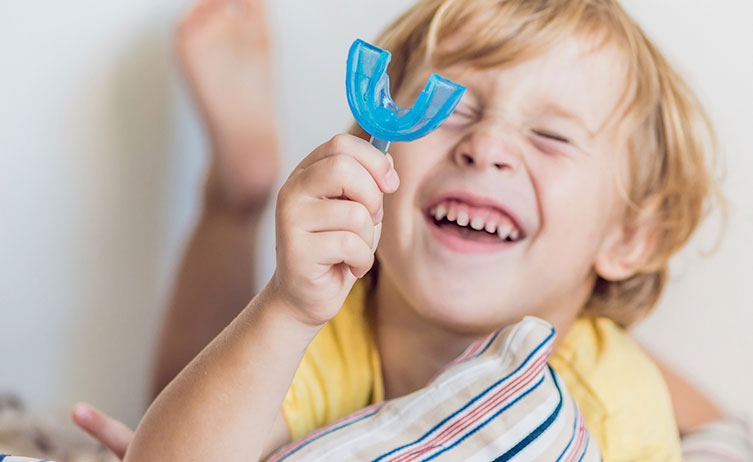
Child Teeth Grinding (Bruxism)
Teeth grinding, also known as bruxism, is a common condition among children that they usually grow out of by adulthood. However, if your child is constantly grinding their teeth over an extended period, they may experience complications with their dental health.
If you’ve noticed your child grinding their teeth during the day or heard them make grinding noises during the night, there’s no need to worry! There are a range of preventative measures and treatments available that we will detail on this page.
What is Teeth Grinding?
Bruxism is a habit that involves a person clenching, grinding and gnashing their teeth. As bruxism is an involuntary habit, your child is likely to not even be aware that they are grinding their teeth.
There are two types of bruxism, these being:
- Awake Bruxism: occurs when your child is grinding their teeth during the day while they are awake.
- Nocturnal Bruxism: is the more prevalent type and occurs when your child grinds their teeth at night while sleeping.
Most people grind their teeth at one point or another, however, research has found that bruxism is highest among children, affecting 14% to 17% of kids.
Why Do Kids Grind Their Teeth?
Your child can start grinding their baby teeth as early as 6 months of age or, it can occur later when their permanent teeth arrive at the age of 5. While there is no one reason to explain why children grind their teeth, research has found potential explanations.
Such reasons include:
- If your child is teething, they may grind their teeth to ease their sore gums.
- Your baby may want to explore the feeling of their new baby teeth, including the sound they make.
- If your child has an earache they may grind their teeth to help relieve pain.
- Your child may grind their teeth to help them deal with stress or anxiety. This can be brought on from new schools, nightmares, or weaning from breastfeeding.
Risk Factors for Children Grinding Teeth
Certain risk factors have also been linked with bruxism and may prompt teeth grinding in your child.
Your kid may be more at risk of grinding his or her teeth if they:
- Have poor oral hygiene
- Have misaligned upper and lower teeth
- Have enlarged tonsils which obstruct upper airway flow
- Have Development disorders such as down syndrome, epilepsy or cerebral palsy
- Take amphetamine-based medications (common in ADHD or antidepressant medications)
- Breath through their mouth and snore (e.g. sleep apnea)
- Have acid reflux
Is it Normal for My Child to Grind Their Teeth?
Bruxism is a common habit among children under the age of 11, so there’s no need to worry if you hear your kid’s tooth grinding during the day or night. As children’s teeth and jaws change, there is no real risk of long term damage unless they continue the habit into their adolescent years.
Teeth Grinding Symptoms and Signs
Bruxism is an involuntary habit that occurs unconsciously, making it hard for both you and your child to identify the condition until they have a sore jaw.
However, there are some common signs and symptoms that indicate a child’s teeth grinding, such as:
- Tooth wear, including visibly worn, flattened or chipped enamel
- Your child complaining of sensitive teeth (for example, pain when chewing or drinking hot and cold beverages)
- Grinding sound
- Your child complains of morning pain in their jaw
- Headaches
- Increased size in jaw muscles
Complications for Children Grinding Teeth
While most kids outgrow bruxism before any serious damage is inflicted, excessive grinding over some time can deteriorate the tooth enamel. The enamel is the outer layer of your tooth and helps protect the more sensitive inner parts.
Other long term complications from excessive bruxism can include temporomandibular joint disorders (TMJ), which is a problem that causes the pain, clicking and locking of the jaw.
Sleep studies have also connected bruxism with a higher rate of sleeping disorders. This is because when children become aware of their nocturnal grinding, they can grow stressed and cause trouble sleeping.

How to Stop Your Child from Grinding Teeth
There is no one singular treatment that can cure your child’s teeth grinding habit. Furthermore, as children are likely to outgrow t
heir bruxism, there is usually no need for immediate intervention and treatment. If your child’s bruxism suddenly appeared after they started taking antidepressant medications, you should also consider speaking to their doctor to minimise the dosage.
Other practical measures to help limit your child’s teeth grinding include:
- Promoting stress management
- Massaging and stretching your child’s jaw before putting them to bed
- Ensuring that your child drinks plenty of water because dehydration has been linked with teeth grinding.
How to Stop Your Child From Grinding Their Teeth At Night
In the cases of older children with nocturnal bruxism, a dentist may create a mouthguard (also called a nightguard) that they can wear at night to minimise the potential for other oral health complications. Improved sleep hygiene also can help children minimise the impacts of their nocturnal grinding. You can achieve this by promoting regular exercise or using relaxation techniques before putting them to bed.
Preventing Child Tooth Grinding
As bruxism is a normal part of your child’s growth and development, there are no preventative measures that you can take to minimise their teeth grinding habit.
However, you can avoid stress-induced bruxism by helping your child manage their stress or anxieties. Have conversations with your child to find out what is distressing them, and if necessary, you can always contact a mental health professional for support.
When to Consult a Dentist
If you’re still worried about the impact of your child’s grinding habits on their dental health, contact our expert paediatric dental team for a consultation. Putney Dental can provide the best quality care for your child’s teeth, and we also can make a night guard to help nighttime grinding.
FAQs
How Long Does Bruxism Last?
While bruxism is common in young children, they will grow out of the grinding habit by adulthood.
How Do I Stop My Child From Grinding Their Teeth?
There are a range of measures you can take to stop your child from grinding their teeth, such as stress management, massaging their jaw before bed and ensuring adequate hydration levels.
Is it Bad that My Kid Grinds Their Teeth?
Teeth grinding is a normal habit for kids to develop. As their jaws change constantly, they are likely to outgrow the habit before any serious damage can occur.
Children's Dentist Near Me
Address
A. Suite 5, 227 Morrison Rd, Putney, NSW 2112
(Next Door To Royal Rehab)
Reserved Parking Available At Rear.
Opening Hours
Monday – 8:30 am – 5:30 pm
Tuesday – 8:30 am – 5:30 pm
Wednesday – 8:30 am – 5:30 pm
Thursday – 8:30 am – 5:30 pm
Friday – 8:30 am – 5:30 pm
Saturday – 8:00 am – 1:00 pm
Emergency Appointments Available
Call us today on (02) 9808 2588 or book an appointment online.
Book Online